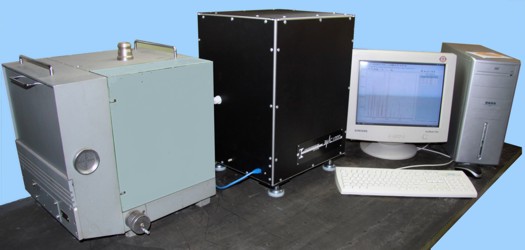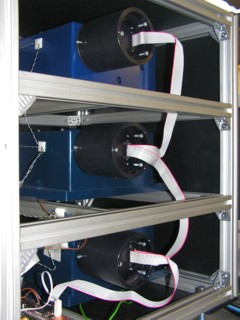Atomic-emission spectrometer EMAS-200D (EMAS-1000) and UniChrom n-Vision
 |
Producer: JSC "Spectroscopic Systems" Equipped with the UniChrom n-VisiON software |
Highlights
Differences between EMAS-200 and EMAS-1000
| Characteristic | EMAS-200 D | EMAS-1000 |
| Number of sensors (CCD/DAD) | 1 | 1..5 |
| Number of monochromators | 1 | 1..5 (fixed) |
| PC connection | RS-232 / USB | 100 Base-T Ethernet |
Application field
Using the atomic-emission spectrometer EMAS 200D, it is possible to determine the following alloy marks in different material types:
Copper and copper alloys:
Aluminium and aluminium alloys:
Zinc and zinc alloys:
|
Pure NickelLead and lead-antimony alloys.Steels:
Cast iron of all classes.Precious metals:
|
Mass parts of elements being determined in different materials using atomic-emission spectrometer EMAS-200D
|
Aluminium alloys |
Copper |
Zinc |
Carbon-
and
|
High-alloyed |
Cast |
Impurity in pure materials |
Element |
Conc, % |
Conc, % |
Conc, % |
Conc, % |
Conc, % |
Conc, % |
Conc, % |
Ag |
– |
– |
– |
– |
– |
– |
0.005- 0.025 |
Al |
base |
0.01 - 10.5 |
4.5 - 12.5 |
– |
0.03 - 0.2 |
– |
0.005 - 0.05 |
As |
– |
0.01 - 0.1 |
– |
– |
– |
– |
0.0005 - 0.05 |
Be |
– |
1.5 - 3.5 |
– |
– |
– |
– |
0.001 - 0.02 |
Bi |
– |
0.001 - 0.01 |
– |
– |
– |
– |
0.001 - 0.05 |
Cd |
– |
– |
0.008 - 0.07 |
– |
– |
– |
0.005 - 0.045 |
Co |
– |
– |
– |
– |
– |
– |
0.02 - 0.05 |
Cr |
0.01 - 0.1 |
– |
– |
0.1 - 1.5 |
3.0 - 20.0 |
0.5 - 1.3 |
– |
Cu |
0.1 - 5.5 |
base |
0.5 - 6.0 |
0.05 - 0.5 |
0.07 - 0.4 |
– |
0.01 - 0.2 |
Fe |
0.1 - 1.5 |
0.01 - 5.5 |
– |
base |
base |
base |
0.005 - 0.75 |
Mg |
0.01 - 2.2 |
– |
0.008 - 0.07 |
– |
– |
– |
0.015 - 0.05 |
Mn |
0.05 - 1.5 |
0.01 - 9.0 |
– |
0.1 - 1.5 |
0.1 - 2.3 |
0.3 - 1.0 |
0.0001 - 0.2 |
Mo |
– |
– |
– |
– |
0.1 - 4.0 |
0.1 - 0.6 |
|
Ni |
0.05 - 2.0 |
0.01 - 6.5 |
– |
0.1 - 2.2 |
0.1 - 25 |
0.2 - 1.3 |
0.004 - 0.3 |
P |
– |
0.01 - 1.5 |
– |
– |
– |
– |
– |
Pb |
0.01 - 0.1 |
0.001 - 15.0 |
0.01 - 0.1 |
– |
– |
– |
0.005 - 0.1 |
Sb |
– |
0.001 - 0.5 |
– |
– |
– |
– |
0.001 - 0.01 |
Si |
0.05 - 15.0 |
0.005 - 3.0 |
0.02 - 0.3 |
0.1 - 1.5 |
0.4 - 3.0 |
1.5 - 3.0 |
0.0007 - 0.7 |
Sn |
0.01 - 0.04 |
0.01 - 11.5 |
0.005 - 0.05 |
– |
– |
– |
0.001 - 0.1 |
Ti |
0.01 - 0.5 |
– |
– |
– |
0.07 - 2.0 |
– |
0.02 - 0.2 |
V |
– |
– |
– |
– |
0.1 - 1.2 |
– |
– |
W |
– |
– |
– |
– |
0.1 - 5.0 |
– |
– |
Zn |
0.01 - 1.5 |
0.05 - 14.0 |
base |
– |
– |
– |
0.003 - 0.15 |
Zr |
0.01 - 0.3 |
– |
– |
– |
– |
– |
– |
Due to low power consumption of the instrument (less than 30 W), the instrument do not overheat. Durability term is not less than 10 years (optics do not getting old) and is determined by PC life span, which is a part of instrument.
EMAS 200D shipped with 18 month warranty term.
After-warranty maintenance is carried out upon additional agreement which include travel and postal expends, service personnel salary and spare parts cost.
